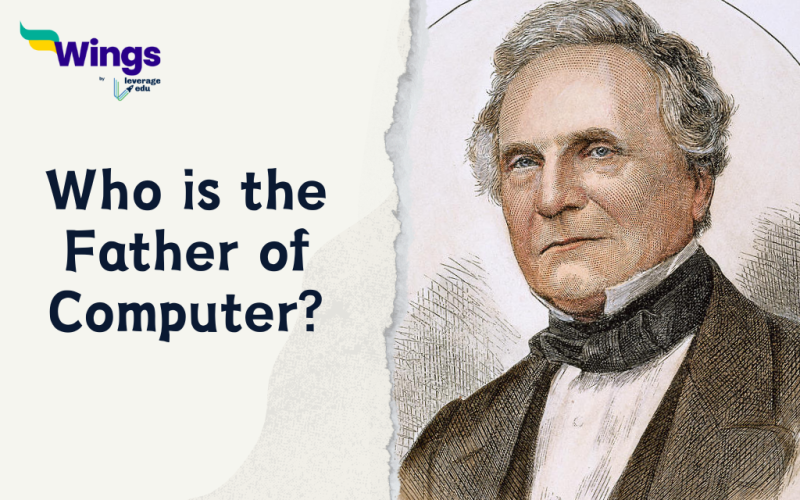The father of computer is Charles Babbage. He is known as the father of computing because he designed a machine called the Analytical Engine in 1837. This machine was like an early computer, with a calculator part (ALU), a way to follow instructions (flow control), and a built-in memory. Unfortunately, he never had enough money to finish building it while he was alive. Let us get to know more about who is the father of computers in detail along with other pioneers.
Even though Babbage did not complete the machine himself, his youngest son Henry Babbage, built a small part of it that could do some calculations in 1910. Finally, in 1991, the London Science Museum built a working version based on Babbage’s plans. So, even though he did not build a working computer in his lifetime, Babbage’s ideas were way ahead of his time and laid the groundwork for future computers, making him the “father of computing.”
Table of Contents [show]
Who is Charles Babbage?
Charles Babbage is also called the father of Modern Digital Computer Innovations. Babbage created the Difference Engine No.2 to tackle mathematical equations and display their solutions through the use of mathematical tables.
- The Science Museum constructed the engine and completed its core component in June 1991, marking the two-hundredth anniversary of Babbage’s birth.
- Charles, known as the father of computers, designed the engine to perform a series of numerical calculations and to automatically display the outcomes or through print.
- However, the Difference Engine No. 2 remained unassembled throughout his lifetime.
| Charles Babbage Overview | |
| Name | Charles Babbage. |
| Name of Parents | Betsy Plumleigh Teape and Benjamin Babbage. |
| Birth | 44 Crosby Row, Walworth Road, London, United Kingdom. |
| Born | 26th December, 1791. |
| Education | King Edward VI Grammar School, Holmwood Academy, Trinity College Cambridge, Peterhouse Cambridge |
| Spouse | Georgiana Whitmore |
| Achievements | Created the initial models of the Difference Engine and the Analytical Engine |
| Died | 18th October, 1871. |
Other Pioneers in Computer Fields
The contributions of other pioneers in addition to Charles Babbage, Konrad Zuse, Alan Mathison Turing, John Vincent Atanasoff, and Henry Edward Roberts, along with their contributions are –
- Konrad Zuse’s contributions are notable for his creation of the S2 computing machine, considered the world’s first computer designed for process control.
- Alan Mathison Turing is a pioneer for his groundbreaking work in the field of artificial intelligence )AI) and theoretical computer science, where he laid the groundwork for these areas with his theories and mathematical models.
- He further established the foundations of computing and algorithms through the concept of the Turing machine.
- John Vincent Atanasoff is known for his invention of the world’s first digital computer, which is also known as the Atanasoff-Berry Computer.
- Henry Edward Roberts introduced the Micro Instrumentation and Telemetry Systems (MITS) in 1970, which is also a popular electronic calculator kit. He is also known as the father of personal computers.
- This calculator kit later became the foundation for creating the Altair 800 personal computer, which featured the Intel 8080 microprocessor.
Also Read – Which Is India’s First Super Computer?
Published Works of Charles Babbage
The contribution of Charles Babbage can be seen through his published works. He was the initial researcher to invent electronic devices capable of performing calculations. Below are a few of Charles Babbage’s notable works –
| Year | Publication Work |
| 1826 | A Comparative View of the Various Institutions for the Assurance of Lives |
| 1827 | Table of Logarithms of the Natural Numbers from 1 to 108,000 |
| 1830 | Reflections on the Decline of Science in England |
| 1832 | On the Economy of Machinery and Manufactures |
| 1837 | Ninth Bridgewater Treatise |
| 1864 | Passages from the Life of a Philosopher |
FAQs
The earliest computer that had similarities to the contemporary devices we recognize exist was created by Charles Babbage between the years 1833 and 1871. He crafted and dedicated almost four decades to creating a machine called the analytical engine. This mechanical computer had the capability to carry out basic computations.
Ada Lovelace is known as the first programmer in the world.
Vijay Pandurang Bhatkar, an Indian computer scientist, is popularly known as the father of the Indian Supercomputer.
TIFRAC (Tata Institute of Fundamental Research Automatic Calculator) holds the distinction of being the inaugural computer to be created in India, situated at the Tata Institute of Fundamental Research in Mumbai. It began with the creation of a TIFR Pilot Machine in the 1950s, which went into operation in 1956.
Relevant Blogs
That is all about who is the father of computers. If you want to know more about topics like this, then visit our general knowledge page!
 One app for all your study abroad needs
One app for all your study abroad needs















 45,000+ students trusted us with their dreams. Take the first step today!
45,000+ students trusted us with their dreams. Take the first step today!
